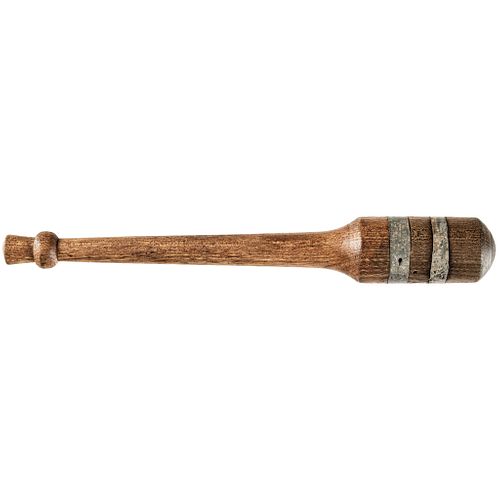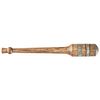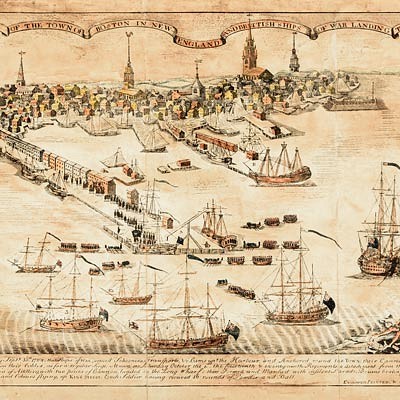c. 1800 Early 19th Century Naval Midshipmans Wooden Pressgang Tool
Lot 223
Categories
Estimate:
$600 - $800
Absentee vs Live bid
Two ways to bid:
- Leave a max absentee bid and the platform will bid on your behalf up to your maximum bid during the live auction.
- Bid live during the auction and your bids will be submitted real-time to the auctioneer.
Bid Increments
| Price | Bid Increment |
|---|---|
| $0 | $10 |
| $200 | $20 |
| $300 | $25 |
| $500 | $50 |
| $1,000 | $100 |
| $2,000 | $200 |
| $3,000 | $250 |
| $5,000 | $500 |
| $10,000 | $1,000 |
| $20,000 | $2,000 |
| $30,000 | $2,500 |
| $50,000 | $5,000 |
| $100,000 | $10,000 |
| $200,000 | $20,000 |
| $300,000 | $25,000 |
| $500,000 | $50,000 |
About Auction
By Early American History Auctions
Mar 20, 2021
Set Reminder
2021-03-20 12:00:00
2021-03-20 12:00:00
America/New_York
Bidsquare
Bidsquare : Autographs-Colonial-Political-Americana
https://www.bidsquare.com/auctions/early-american-history-auctions/autographs-colonial-political-americana-6509
330 Lots of Rare, Historic Autographs, Americana, Civil War Era, George Washington, Abraham Lincoln, Slavery & Black History, Revolutionary War Era, Colonial America, Federal Period, War of 1812, Colonial Currency, Indian Peace Medals & more... Early American History Auctions auctions@earlyamerican.com
330 Lots of Rare, Historic Autographs, Americana, Civil War Era, George Washington, Abraham Lincoln, Slavery & Black History, Revolutionary War Era, Colonial America, Federal Period, War of 1812, Colonial Currency, Indian Peace Medals & more... Early American History Auctions auctions@earlyamerican.com
- Lot Description
Post-Revolutionary War to Civil War
Exceptional Construction Naval Wooden "Pressgang" Tool with Two Heavy Weighted Metal Bands Within Its Head
c. 1800 Early 19th Century Naval Midshipman's Wooden "Pressgang" Tool (Blackjack) with a rarely seen use of two heavy metal bands in its weighted head, Extremely Fine.
This Naval Pressgang tool is slightly used and remains in choice original condition, measuring 10.2 inches long and its solid head measures 1.4 inches in diameter. The solid wood surfaces have a nice natural patina acquired from age as shown in our photos. The head has two heavy weighted lead metal bands laid within the wood to make this tool more "persuasive" in its use. Pressgang tools were used for keeping sailors in line, and for "Pressgang" recruitment to abduct likely sailors to serve on ships, as well as sometimes being useful during a boarding attack, or in self defense on pay day at the docks.
Impressment, colloquially "the press" or the "press gang", is the taking of men into a military or naval force by compulsion, with or without notice. European navies of several nations used forced recruitment by various means.
The large size of the British Royal Navy in the Age of Sail meant impressment was most commonly associated with Great Britain and Ireland. It was used by the Royal Navy in wartime, beginning in 1664 and during the 18th and early 19th centuries as a means of crewing warships, although legal sanction for the practice can be traced back to the time of Edward I of England. The Royal Navy impressed many merchant sailors, as well as some sailors from other, mostly European, nations.
People liable to impressment were "eligible men of seafaring habits between the ages of 18 and 55 years". Non-seamen were sometimes impressed as well, though rarely.
Impressment was strongly criticized by those who believed it to be contrary to the British constitution; unlike many of its continental rivals at the time, British subjects were not subject to conscription for military service, with the exception of a brief experiment with army impressment from 1778 to 1780. Though the public opposed conscription in general, impressment was repeatedly upheld by the courts, as it was deemed vital to the strength of the navy and, by extension, to the survival of the British influence and realm.
Impressment was essentially a Royal Navy practice, reflecting the sheer size of the British fleet and its substantial manpower demands. While other European navies applied forced recruitment in times of war, this was generally done as an extension of the practice of formal conscription applied by most European armies from the Napoleonic Wars on. The U.S. Continental Navy also applied a form of impressment during the American War of Independence.
The impressment of seamen from American ships caused serious tensions between Britain and the Thirteen Colonies in the years leading up to the Revolutionary War. One of the 27 Colonial grievances enumerated in the Declaration of Independence directly highlights the practice.
It was again a cause of tension leading up to the War of 1812. After the defeat of Napoleon in 1815, Britain formally ended the practice; later conscription was not limited to the Royal Navy but covered all British armed forces.
Our Auction Contents:
Black History & Slavery: (Lots 1 - 63)
Abraham Lincoln Related: (Lots 64 - 74)
Historic Autographs: (Lots 75 - 235)
Colonial America: (Lots 236 - 261)
Revolutionary War: (Lots 262 - 304)
George Washington Related: (Lots 305 - 306)
Early American Guns & Weapons: (Lots 307 - 318) - Shipping Info
-
Early American provides in-house worldwide shipping. Please contact us directly if you have questions about your specific shipping requirements.
-
- Buyer's Premium



 EUR
EUR CAD
CAD AUD
AUD GBP
GBP MXN
MXN HKD
HKD CNY
CNY MYR
MYR SEK
SEK SGD
SGD CHF
CHF THB
THB












